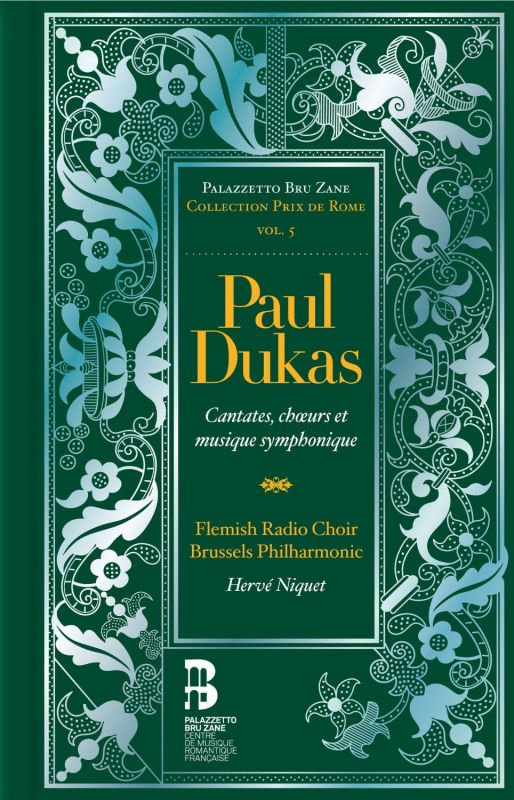DUKAS Cantates, choeurs et musique symphonique
View record and artist detailsRecord and Artist Details
Composer or Director: Paul (Abraham) Dukas
Genre:
Vocal
Label: Ediciones Singulares
Magazine Review Date: 02/2016
Media Format: CD or Download
Media Runtime: 101
Mastering:
DDD
Catalogue Number: ES1021

Tracks:
| Composition | Artist Credit |
|---|---|
| Les Sirènes |
Paul (Abraham) Dukas, Composer
Brussels Philharmonic Orchestra Flemish Radio Choir Hervé Niquet, Conductor Paul (Abraham) Dukas, Composer |
| La Fête des myrtes |
Paul (Abraham) Dukas, Composer
Brussels Philharmonic Orchestra Flemish Radio Choir Hervé Niquet, Conductor Paul (Abraham) Dukas, Composer |
| Sémélé |
Paul (Abraham) Dukas, Composer
Brussels Philharmonic Orchestra Flemish Radio Choir Hervé Niquet, Conductor Paul (Abraham) Dukas, Composer |
| Pensée des morts |
Paul (Abraham) Dukas, Composer
Brussels Philharmonic Orchestra Flemish Radio Choir Hervé Niquet, Conductor Paul (Abraham) Dukas, Composer |
| Hymne au soleil |
Paul (Abraham) Dukas, Composer
Brussels Philharmonic Orchestra Flemish Radio Choir Hervé Niquet, Conductor Paul (Abraham) Dukas, Composer |
| L’Ondine et le Pêcheur |
Paul (Abraham) Dukas, Composer
Brussels Philharmonic Orchestra Flemish Radio Choir Hervé Niquet, Conductor Paul (Abraham) Dukas, Composer |
| Velleda |
Paul (Abraham) Dukas, Composer
Brussels Philharmonic Orchestra Flemish Radio Choir Hervé Niquet, Conductor Paul (Abraham) Dukas, Composer |
| Polyeucte |
Paul (Abraham) Dukas, Composer
Brussels Philharmonic Orchestra Flemish Radio Choir Hervé Niquet, Conductor Paul (Abraham) Dukas, Composer |
| Villanelle |
Paul (Abraham) Dukas, Composer
Brussels Philharmonic Orchestra Flemish Radio Choir Hervé Niquet, Conductor Paul (Abraham) Dukas, Composer |
Author: Tim Ashley
A student at the Paris Conservatoire from 1881, Dukas entered the competition annually between 1886 and 1889, each time submitting the prescribed short work for chorus and orchestra, which, if accepted, permitted entry to the second round, where the final outcome was judged on the composition of a dramatic cantata. There was no choice of subject, and one of the competition’s limitations was that composers were saddled with prescribed texts, often of mediocre quality. Only the 1886 choral entry, Pensée des morts, to a poem by Alphonse de Lamartine, gave Dukas the opportunity to set a major French writer, and he responded with a quiet elegy, graced by closely woven polyphony and an exquisite a cappella passage at its close. Its immediate successors, the Classical La fête des myrtes (1887) and the Orientalist Hymne au soleil (1888) are foursquare and pompous in comparison. Dukas may well have been tempering his style to suit his judges, however. L’Ondine et le Pêcheur, written when he was only 19 to a poem by Théophile Gautier on a variant of the Lorelei legend, is more original than all three. Its swaying vocal line, slithering harmonies and extraordinary orchestration, which weaves saxophones, piano and glockenspiel into the diaphanous textures, pre-empts much of his later music.
Hymne au soleil, however, caught the judges’ attention. Dukas’s first cantata, Velléda, takes its subject from Chateaubriand’s 1809 epic Les martyrs (a source for Bellini’s Norma), dealing with the catastrophic affair between the Druid priestess Velléda and Eudore, a Roman army officer. The text is dreadful: Chateaubriand would probably have turned in his grave at Velléda’s opening gambit, ‘Je suis la fée aux ailes d’or’. But the piece itself, structured round a pastoral opening, an agitated central love duet and an intense final trio with Velléda’s appalling father Ségenax, displays considerable dramatic power. Dukas was awarded second place, and bitterly disappointed.
The 1889 competition, however, provoked a crisis. In both his pieces, Dukas brought his admiration for Wagner controversially to the fore. The choral Sirènes owes much to the Götterdämmerung Rhinemaidens. Sémélé, the second-round cantata, is again tightly focused despite a problematic text, and the score blends Wagnerism with classical restraint. A Walküre-ish storm evokes Juno’s implacable jealousy while a reiterated brass monotone, like Hunding’s horn call, tracks her errant husband down. The vocal writing, however, has a sculpted loftiness that peers back through Berlioz towards Gluck. The resulting amalgam is startling, though the judges dismissed it out of hand. Dukas left the Conservatoire in disgust, believing he was the victim of anti-Wagnerian discrimination. The brooding Polyeucte, his first work as an independent composer, is the most overtly Wagnerian of his scores.
Hervé Niquet and his forces are superb guides through this repertory, little of which has previously appeared on disc, apart from the comparatively familiar Villanelle and François-Xavier Roth’s 2013 recordings of Velléda and Polyeucte (Actes Sud Musicales, 3/14). Orchestral textures are admirably lucid, the choral singing beautifully focused and the conducting impeccable, though La fête des myrtes and Hymne au soleil could be a bit more brash. Sémélé gets a terrific, high-voltage performance, blazingly sung by Catherine Hunold (Sémélé), Kate Aldrich (Juno) and Tassis Christoyannis (Jupiter). Velléda is altogether more measured: Frédéric Antoun is the lyrically passionate Eudore, opposite Marianne Fiset’s occasionally shrill Velléda and Andrew Foster-Williams’s bluff Ségenax. Chantal Santon-Jeffery does exquisite things with L’Ondine et le Pêcheur, which really deserves be heard more often. The whole thing adds immeasurably to our understanding of Dukas and is a very fine achievement indeed.
Discover the world's largest classical music catalogue with Presto Music.

Gramophone Digital Club
- Digital Edition
- Digital Archive
- Reviews Database
- Full website access
From £8.75 / month
Subscribe
Gramophone Full Club
- Print Edition
- Digital Edition
- Digital Archive
- Reviews Database
- Full website access
From £11.00 / month
Subscribe
If you are a library, university or other organisation that would be interested in an institutional subscription to Gramophone please click here for further information.




